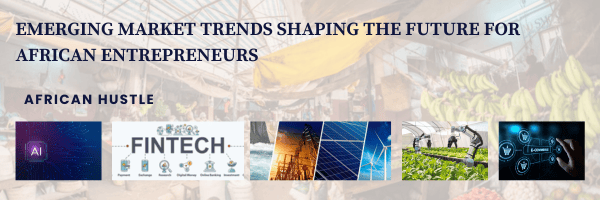
In his acceptance speech as the first President of the Organization of African Unity (OAU), former Emperor of Ethiopia, Haile Selassie made the above-quoted statement.
That was in 1963. Africa was reeling from the shackles of colonialism. It had a population of 250 million. At this juncture, Africans realized that if they were to enjoy any form of emancipation from repressive colonial regimes, they had to unite as a continent.
Today we stand at another juncture. Africa’s population has since quadrupled. We are no longer grappling with colonialism but still striving for economic emancipation. Another realization that we are making is that if we are ever to progress, we have to do so as a united Africa.
We echo the same sentiments as our forefathers and take upon ourselves the lifetime duty and privilege to rouse the sleeping giant of Africa.
As the continent continues to witness rapid economic growth and technological advancements, it is crucial for entrepreneurs on the continent to stay ahead of the curve by understanding and leveraging emerging market trends.
Today we will explore some of the most significant trends that are shaping the future for African entrepreneurs, along with real-world examples that highlight the potential business opportunities they present.
Let’s dive in!
E-commerce and Digital Marketplaces:
The rise of e-commerce and digital marketplaces has transformed the way Africans shop and do business. Platforms like Jumia, Konga, and Takealot have gained traction, offering convenient online shopping experiences. African entrepreneurs can tap into this trend by building niche e-commerce platforms, exploring dropshipping models, or creating innovative digital marketplaces to connect buyers and sellers in specific industries or regions.
Fintech Innovation:
Fintech has revolutionized financial services in Africa, providing access to banking, payments, and insurance solutions for previously underserved populations. Mobile money services like M-Pesa in Kenya and Ecobank's Mobile App have become household names. African entrepreneurs can capitalize on this trend by developing innovative fintech solutions, such as digital wallets, microinsurance platforms, and peer-to-peer lending platforms tailored to local needs. Other companies leading innovation in the fintech sector include Flutterware, Interswitch, Opay, Wave, and Jumo.
Renewable Energy Solutions:
With Africa's abundant natural resources, renewable energy is gaining traction as a sustainable and reliable source of power. Startups like M-KOPA Solar and Off-Grid Electric (OGE) are providing affordable solar energy solutions to off-grid communities. Entrepreneurs can explore opportunities in solar power installation, manufacturing solar products, or developing smart grid technologies to improve energy access and efficiency.
Agribusiness and Food Innovation:
Agriculture remains a critical sector in Africa, and entrepreneurs are leveraging technology to drive innovation in this space. Companies like Twiga Foods and Farmcrowdy are digitizing supply chains, connecting farmers directly with buyers, and promoting sustainable farming practices. Entrepreneurs can tap into this trend by developing agri-tech solutions, vertical farming systems, or value-added food processing ventures.
HealthTech and Telemedicine:
The COVID-19 pandemic has accelerated the adoption of telemedicine and digital health solutions across Africa. Startups like Helium Health and Kangpe are offering teleconsultation platforms, electronic medical record systems, and health information apps. Entrepreneurs can explore opportunities in developing health-focused mobile apps, remote patient monitoring devices, or AI-driven diagnostic tools to improve healthcare access and delivery.
EdTech and E-Learning:
The demand for quality education and skills development in Africa has led to the rise of EdTech startups. Platforms like Andela and Gebeya are providing online learning opportunities and connecting African talent with global job opportunities. Entrepreneurs can contribute to this trend by creating e-learning platforms, developing educational content, or offering online skill development programs tailored to local needs.
Circular Economy and Sustainability:
Sustainability and environmental conservation are gaining momentum in Africa. Entrepreneurs are finding innovative ways to reduce waste, promote recycling, and create sustainable products. Examples include recycling startups like Wecyclers in Nigeria and Repurpose Schoolbags in South Africa. Entrepreneurs can explore opportunities in recycling, upcycling, eco-friendly packaging, or sustainable fashion ventures.
IBM’s CEO, Arvind Krishna, has mentioned plans to use AI to replace 7,800 jobs over the next five years.
As an entrepreneur, above leveraging current trends you need to anticipate future opportunities.
So what can you adopt early so that you always stay ahead?
Artificial Intelligence (AI): AI has the potential to revolutionize various industries by automating tasks, improving decision-making processes, and enabling the development of new products and services. It can disrupt industries such as healthcare, finance, transportation, and customer service.
Blockchain: Blockchain technology has gained attention primarily due to its application in cryptocurrencies like Bitcoin. However, its potential extends far beyond digital currencies. Blockchain can disrupt industries by providing decentralized and secure solutions for transactions, supply chain management, smart contracts, and identity verification.
Internet of Things (IoT): IoT refers to the network of physical devices embedded with sensors, software, and connectivity, enabling them to collect and exchange data. IoT has the potential to transform industries such as manufacturing, healthcare, agriculture, and smart cities. It can lead to increased efficiency, improved decision-making, and the creation of new business models.
3D Printing: Also known as additive manufacturing, 3D printing allows the creation of physical objects by layering materials based on digital designs. It has the potential to disrupt traditional manufacturing processes, enabling customized production, reducing waste, and decentralizing manufacturing capabilities.
Virtual and Augmented Reality (VR/AR): VR and AR technologies are evolving rapidly and have the potential to transform various industries. They can revolutionize gaming and entertainment experiences, enhance training and education, enable virtual collaboration, and improve customer engagement in retail and e-commerce.
By keeping a finger on the pulse of emerging market trends, African entrepreneurs can identify and seize exciting business opportunities.
The trends mentioned in this newsletter are just a glimpse into the vast potential that exists across various sectors. By embracing innovation, leveraging technology, and understanding the evolving needs of African consumers, entrepreneurs can pave the way for a prosperous and impactful future.
Remember, these trends are constantly evolving, and it's essential to stay agile and adaptable.
Continuously research, learn, and network to stay abreast of the evolving African business landscape.
Happy Hustling!
Tre

